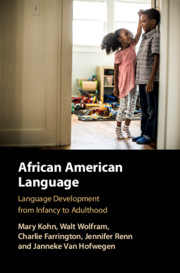Refine search
Actions for selected content:
11 results
Chapter 14 - Dictionaries, Language Ideologies, and Language Attitudes
- from Part III - Dictionaries and Ideology
-
-
- Book:
- The Cambridge Handbook of the Dictionary
- Published online:
- 19 October 2024
- Print publication:
- 31 October 2024, pp 277-300
-
- Chapter
- Export citation
Chapter 24 - Performing Gender in Korean: Language, Gender, and Social Change
- from Part V - Sociolinguistics and Psycholinguistics
-
-
- Book:
- The Cambridge Handbook of Korean Linguistics
- Published online:
- 30 September 2022
- Print publication:
- 25 August 2022, pp 689-716
-
- Chapter
- Export citation
Observing linguistic evolution in an Irish archipelago
-
- Journal:
- Journal of Linguistic Geography / Volume 9 / Issue 1 / April 2021
- Published online by Cambridge University Press:
- 01 October 2021, pp. 28-39
-
- Article
- Export citation
6 - The Cognitive Structure behind Indexicality: Correlations in Tasks Linking /s/ Variation and Masculinity
- from Part I - Where Is (Social) Meaning?
-
-
- Book:
- Social Meaning and Linguistic Variation
- Published online:
- 30 July 2021
- Print publication:
- 12 August 2021, pp 127-150
-
- Chapter
- Export citation
5 - Sociophonetics and Social Factors
-
- Book:
- Sociophonetics
- Published online:
- 26 February 2021
- Print publication:
- 11 March 2021, pp 96-125
-
- Chapter
- Export citation
5 - Caretaker’s Influence on Vernacularity
-
- Book:
- African American Language
- Published online:
- 24 November 2020
- Print publication:
- 03 December 2020, pp 111-134
-
- Chapter
- Export citation

African American Language
- Language development from Infancy to Adulthood
-
- Published online:
- 24 November 2020
- Print publication:
- 03 December 2020

Korean
- A Linguistic Introduction
-
- Published online:
- 14 November 2019
- Print publication:
- 12 December 2019
Language choice and gender in a Nordic social media corpus
-
- Journal:
- Nordic Journal of Linguistics / Volume 42 / Issue 1 / May 2019
- Published online by Cambridge University Press:
- 15 July 2019, pp. 31-55
-
- Article
- Export citation
Homosocial desire in men's talk: Balancing and re-creating cultural discourses of masculinity
-
- Journal:
- Language in Society / Volume 34 / Issue 5 / November 2005
- Published online by Cambridge University Press:
- 12 October 2005, pp. 695-726
- Print publication:
- November 2005
-
- Article
-
- You have access
- HTML
- Export citation
Localizing power and solidarity: Pronoun alternation at an all-female police station and a feminist crisis intervention center in Brazil
-
- Journal:
- Language in Society / Volume 32 / Issue 3 / June 2003
- Published online by Cambridge University Press:
- 21 October 2003, pp. 351-381
- Print publication:
- June 2003
-
- Article
- Export citation
